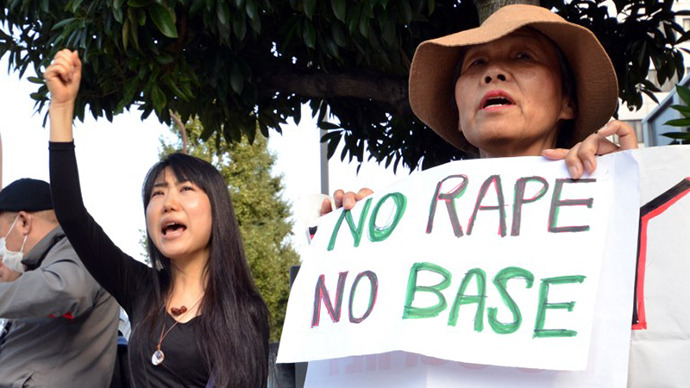Two US Navy sailors convicted of rape that shocked Japan

Two US Navy sailors have been convicted of raping a Japanese woman in Okinawa while on duty. The rape, which occurred in October, provoked anger among locals and forced the American military to enforce a curfew upon its service members.
The two Americans plead guilty to the charges, admitting to raping the young Japanese woman and robbing her of about $76 in October 2012. The indictment claims that the two sailors “attacked the woman as she walked along a street in central Okinawa just before 4 a.m., choking her and covering her mouth, causing a neck sprain, as they forced her to have sex” with both of them.
The rape dominated Japanese news reports late last year and prompted a reaction from American ambassador to Japan, John V. Roos, who said the US government was “extremely concerned.”
“These allegations, given their seriousness, will continue to command my full personal attention,” Roos told the New York Times in a statement.
This week, the Japanese court in Naha sentenced 24-year-old Seaman Christopher Browning to 10 years imprisonment and 23-year-old Petty Officer 3rdClass Skyler Dozierwalker to nine years imprisonment. Both of them plead guilty to the charges. Browning is serving a longer sentence for robbing the victim of her cash.
While handing down the sentence, presiding judge Hideyuki Suzuki described the Navy sailors’ actions as “contemptible and violent”. The two men will spend the next decade locked up in a Japanese prison.
Since the rape occurred, Okinawans have been outraged at the presence of American forces on their island. They had already been uncomfortable with the military personnel and have long complained about disruptive behavior and crimes conducted by US service members.
In September, the US had also decided to base a new type of aircraft, a tilt-rotor MV-22 Osprey, at an Okinawan Marine facility. The local population heavily protested the Osprey’s deployment, due to its poor safety record in training flights. Ignoring the Okinawan’s opposition, the US deployed the aircraft and reignited a deep Japanese resentment of the military.
After the rape, public anger reached its highest level and the US military was forced to impose a curfew upon its personnel in Japan.
Most crimes committed by US service members in Japan are dealt with in military courts, but because of the seriousness of the rape case, the Japanese court handled the conviction. Prosecutors initially sought to sentence Browning to 12 years in prison, but the defense argued that this sentence was too excessive.
The case has received widespread media coverage by Okinawan newspapers, who strongly oppose the presence of the US military and intensely cover crimes by American military personnel and their families. In October, the NHK, Japan’s national broadcaster, reported that this was the seventh rape that resulted in the arrest of a American servicemen since the US returned to Okinawa in 1972. In 1995, three Americans kidnapped and raped a 12-year-old Okinawan schoolgirl. The service members beat her, tied her up, and duct-taped her eyes and mouth while raping the child. The incident sparked mass protests against the US military presence.
In the 1995 case, two of the men received seven-year prison sentences and the third received a six-and-a-half year sentence.
The US military is already unpopular in Okinawa, and with each additional crime by service members, resentment continues to rise.














